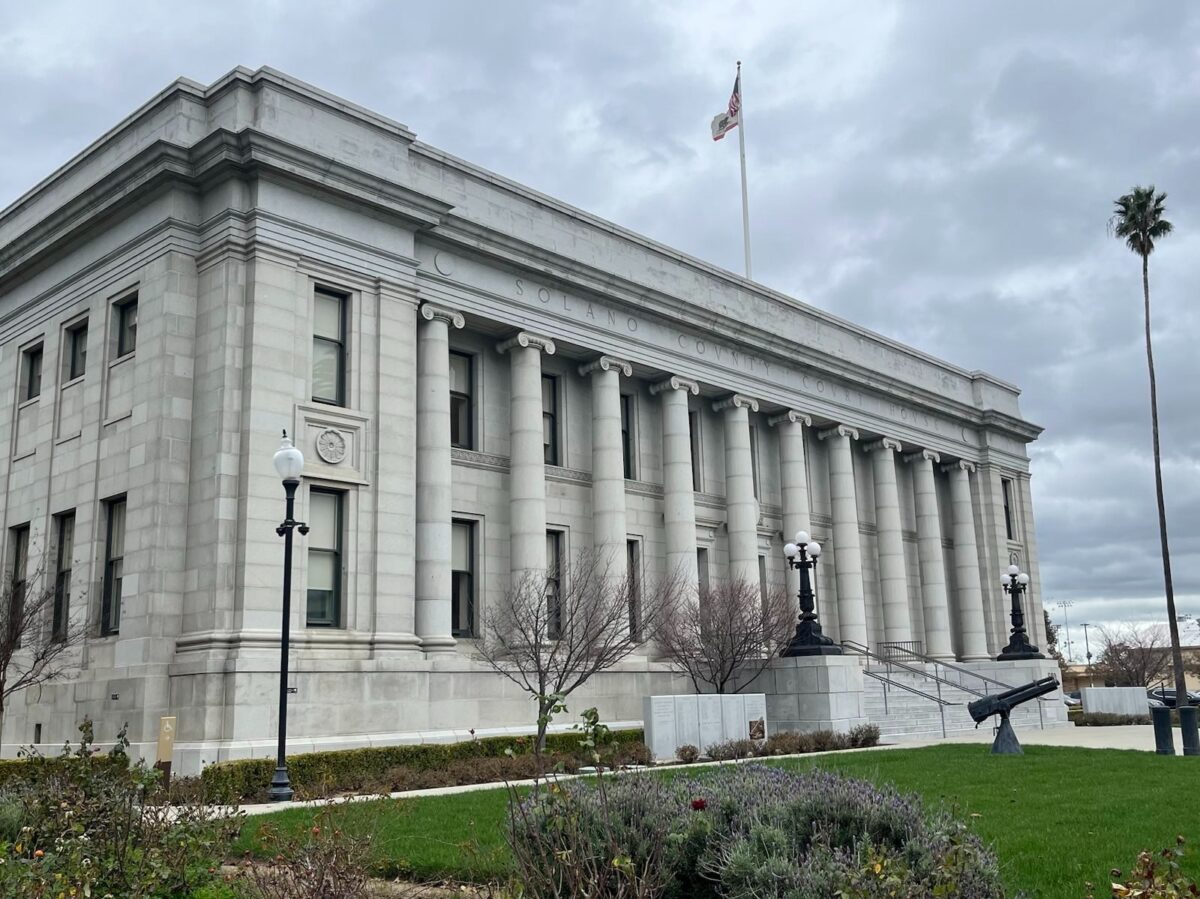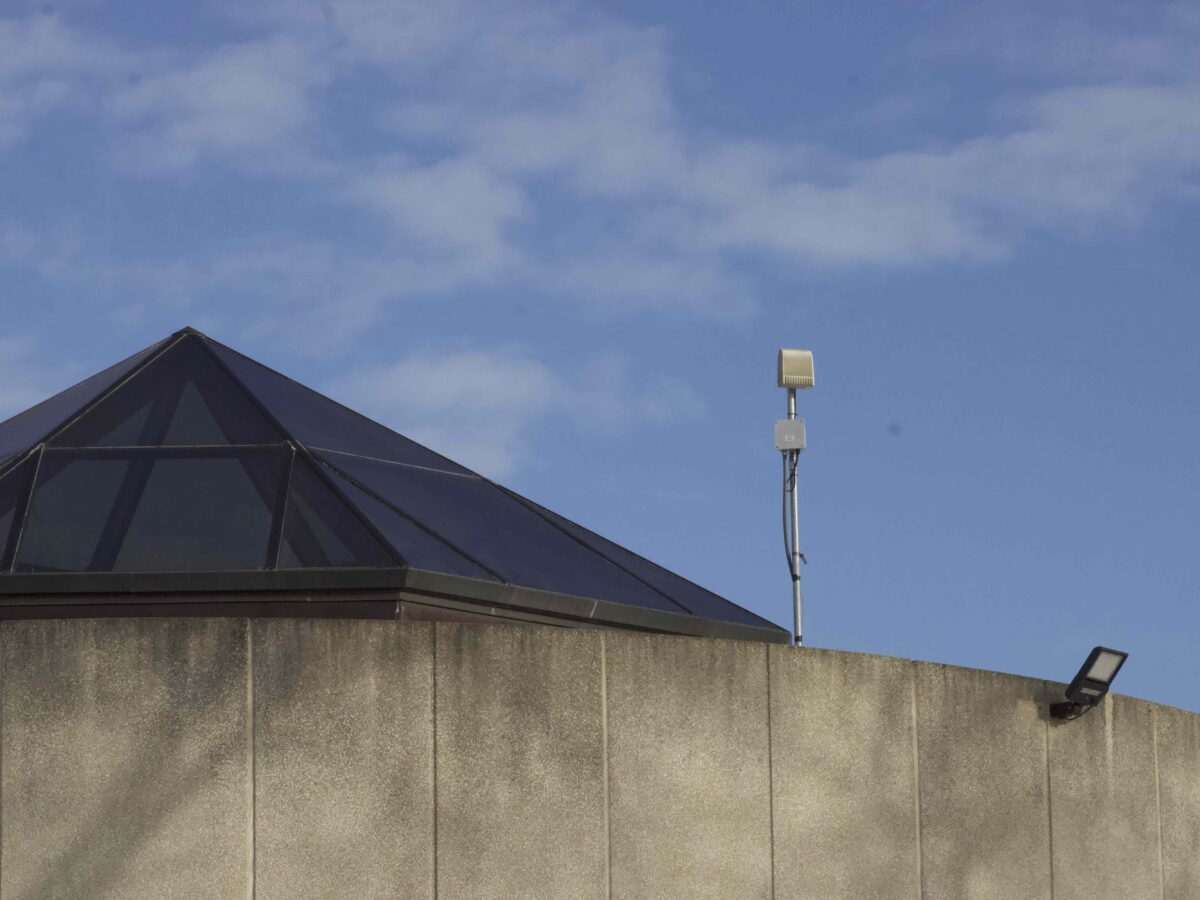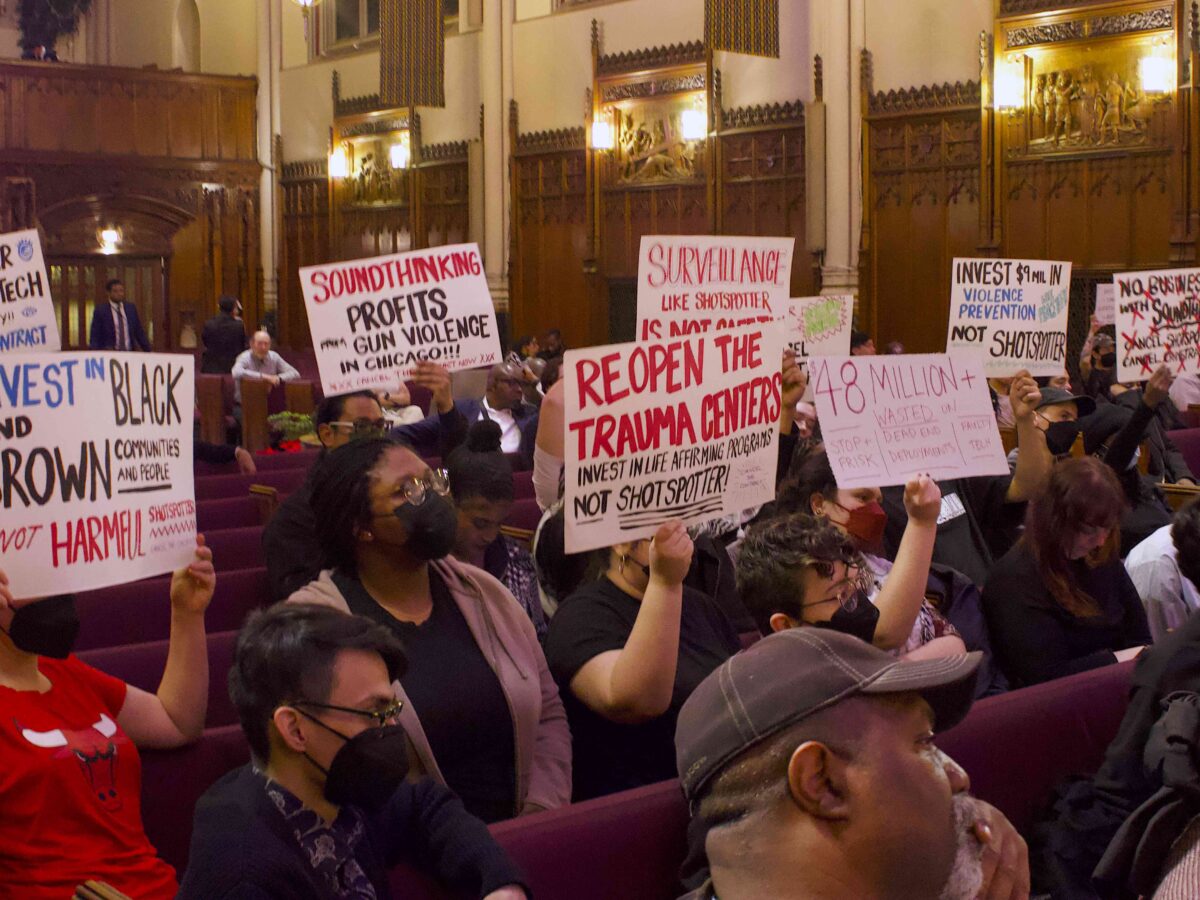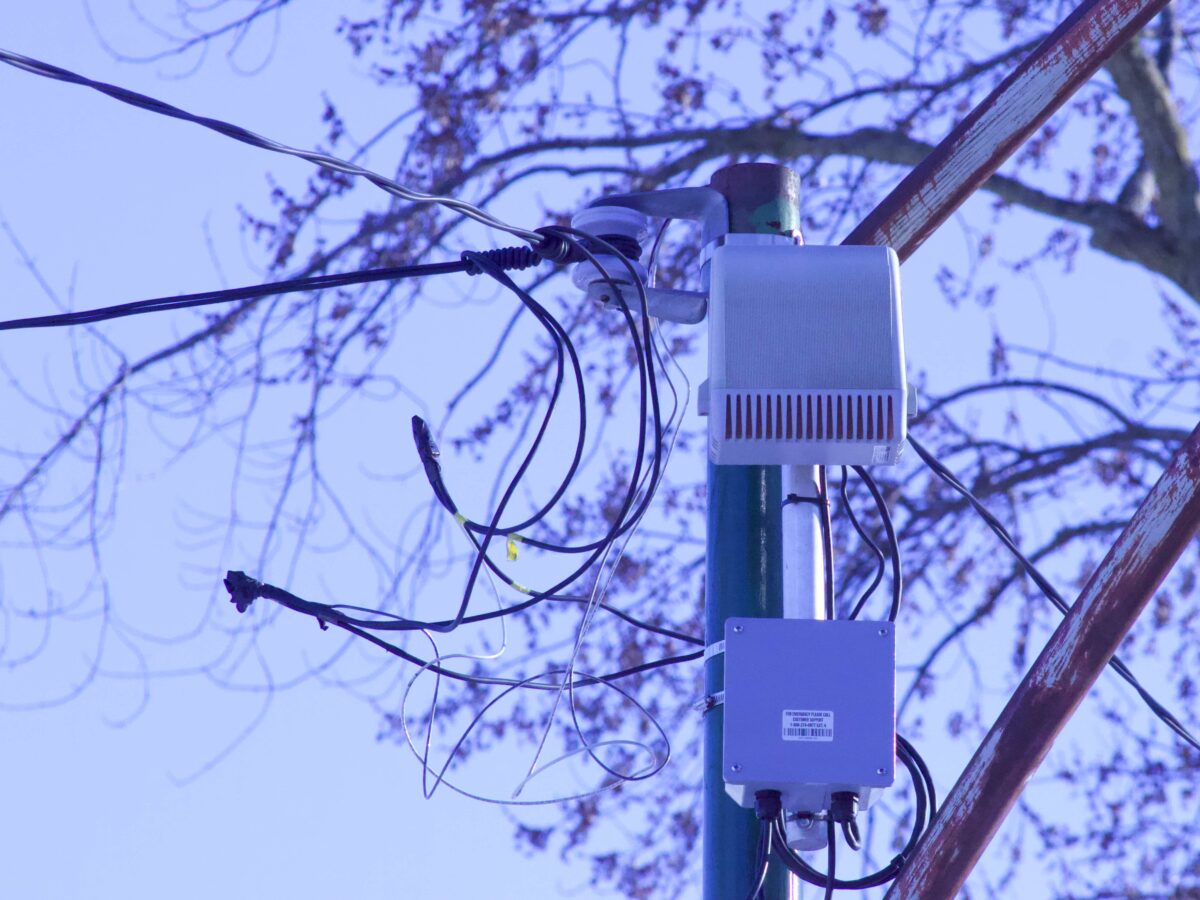In a contentious hearing last month at the Old Solano County Courthouse in Fairfield, California, Judge Christine Carringer heard arguments from attorneys for ShotSpotter and two former employees who the company is suing for allegedly taking confidential company documents and posting them on social media.
In court filings, the former employees, Chris Edwards and Ginsi Robinson, argued the lawsuit is meant to shut them up for raising issues about alleged fraudulent business practices and what they claim was a harmful workplace culture. At issue in the February hearing was whether the lawsuit should be dismissed. ShotSpotter (renamed SoundThinking last year) is represented in this case by Cooley LLP, a large multinational corporate law firm that was founded in Chicago. Edwards and Robinson, who are representing themselves, declined to comment for this article. A ShotSpotter spokesperson did not respond to the Weekly’s requests for comment.
“Sound Thinking formerly known as ShotSpotter is attempting to silence exposure of their toxic workplace environment, rampant sexual and mental harassment, as well as poor business processes which include fraudulent practices of manipulating their data to earn contract agreements with government and local agencies,” wrote Robinson in a motion asking the judge to dismiss the company’s lawsuit. Robinson’s motion argued the case should be thrown out under a California law that allows early dismissal for lawsuits that are filed to stifle speech. ShotSpotter claimed the company is not suing the pair to silence them but to stop them from sharing the information they allegedly took.
Judge Carringer denied the motion to dismiss the case; she had denied a similar one filed by Edwards in January.
ShotSpotter initiated the lawsuit against Edwards and Robinson for allegedly stealing trade secrets. According to ShotSpotter’s complaint against Edwards and Robinson as codefendants, the former employees “misappropriated confidential information” from the company and then posted it to Twitter (or X) to “retaliate against SoundThinking’s termination of Edwards’ employment.” Edwards and Robinson claim the company terminated them without cause in 2023.
Hired in February of 2021, Edwards was the field service technician manager at ShotSpotter. Robinson was a former field services lead who Edwards supervised. The company’s complaint claims that, when Robinson came aboard in December of 2021, she and Edwards already knew each other from a previous job. The company’s complaint claims that they developed a “personal relationship outside of work” and lived together at the time they were fired.
In its complaint, ShotSpotter claims that on the morning of November 6, 2023, about five hours after Edwards was fired, he began downloading sensitive company data that included the precise locations and the operational conditions of the company’s thousands of sensors. According to the company, the data constitutes a trade secret because if it is widely disseminated, ShotSpotter would lose an advantage over competitors seeking how to best deploy and position their own gunshot-detection sensors.
Raytheon, Flock, and EAGL Technologies are among several companies that also sell gunshot detection systems, although ShotSpotter is considered by far the largest purveyor of this kind of technology. Last month, WIRED published maps of every ShotSpotter sensor location in the world based on a document they said was provided to them by a confidential source.
The company claims that shortly after Edwards downloaded that information, ProfessionalFSM@SoundThinkingFM, a Twitter account that had previously voiced support for the company, posted a flurry of tweets criticizing ShotSpotter. Interspersed with those tweets, the account posted screenshots of Excel spreadsheets containing data on the placement of sensors and maps of the precise sensor locations. That account also threatened to reveal the contents of sensitive “top-level” executive emails.
According to the complaint, when ShotSpotter contacted Edwards by email and phone to tell him to stop posting sensor data and maps of sensors, Edwards denied having access to the data and suggested that other former employees could be behind the tweets.
“I have no idea what you are talking about. I do not have access to Sound Thinking information as all of my access was turned off this morning…all information access was cut off at 8:30AM,” the company’s complaint alleges Edwards wrote in an email.
ShotSpotter further alleges that on November 7, 2023, after discovering that Robinson’s company laptop was nearby Edwards’s based on the IP address locations, at a home in Fairfield, California, ShotSpotter contacted her, asking for her help.
“Please know the FBI is involved as a crime has been committed,” wrote Anne Mueller, ShotSpotter’s head of human resources. Minutes later, according to ShotSpotter’s complaint, the ProfessionalFSM@SoundThinkingFM account was deleted, along with the critical tweets.
The same day it filed its complaint, ShotSpotter filed a separate motion seeking a temporary restraining order barring Edwards and Robinson from disseminating or sharing any materials they downloaded after being fired, and to return their company devices. Four days after ShotSpotter filed their complaint in against the former employees, Judge Carringer entered the order, ordering defendants to “return all property in their possession belonging to Plaintiff.”
Edwards was a ShotSpotter employee for more than two years before he was fired. When he started out with the company in 2021, he was tasked with running ShotSpotter’s 3G project and upgrading the system’s sensors from older to newer sensors.
According to a motion he filed seeking to dismiss the lawsuit, Edwards argued that he “was forced by his commitment to our communities to come forward with this information” about ShotSpotter’s alleged fraudulent business practices. ShotSpotter’s lawsuit, he claimed, was “intended to discourage and punish [him for his] exercise of free speech.”
In his motion, Edwards claimed to have witnessed that much of the ShotSpotter system “was broken, decayed and not maintained,” and that code violations were prevalent. Suspecting that a compromised system might not be “relaying the correct data” to customers, Edwards claimed he raised these concerns with his bosses.
But according to Edwards’s legal filing, his bosses wrote those issues off. In his motion, Edwards claimed that John Fountain, ShotSpotter’s former director of field and network operations, told him to “falsify numbers on the deteriorated system to avoid” having to pay back money to cities and agencies for not meeting their contractual obligations. He also claimed, in an affidavit attached to his motion, that Fountain told him to “keep these things in-house” and to “stay out of business that has nothing to do with you.”
ShotSpotter did not directly address any of these allegations in its opposition to Edwards’s motion but claimed that they were “distractions from the claims against him” and an attempt at getting the court to “look over there, not over here.”
RELATED STORY
Missed Shots
Edwards brought his motion to dismiss the complaint pursuant to California’s anti-SLAPP (Strategic Lawsuit Against Public Participation) law. Currently, thirty-three states have anti-SLAPP laws, including Illinois. Those statutes are intended to protect people and media outlets exercising their First Amendment rights from facing expensive and frivolous lawsuits.
In an opposition brief responding to Edwards’s anti-SLAPP motion, ShotSpotter called the motion “just the latest in a long series of games and stalling tactics” and “yet another delay tactic” by a “disgruntled former employee” attempting to “recast himself as a public interest activist.”
“SoundThinking is not suing Edwards for saying bad things about SoundThinking,” read an opposition brief filed by ShotSpotter on December 27, 2023. “Rather, SoundThinking is suing Edwards because he stole confidential and proprietary data from SoundThinking, in violation of multiple laws.”
The brief went on to argue that “because neither Edwards’ accessing computers (SoundThinking’s database and laptop) without authorization nor his knowing failure to turn over his work laptop has any logical relation to ‘the constitutional rights of freedom of speech and petition for the redress of grievances,’ such activities clearly fall outside the scope of the anti-SLAPP statute’s protections.”
At a January 10, 2024 hearing, Judge Carringer agreed with ShotSpotter and dismissed Edwards’s anti-SLAPP motion, allowing the case to proceed against him.
Two days later, Robinson filed a separate motion to dismiss ShotSpotter’s complaint against her under California’s anti-SLAPP law that included additional allegations not made by Edwards. She claimed that ShotSpotter was seeking to suppress her speech for exposing a “toxic workplace environment, rampant sexual and mental harassment as well as poor business processes.”
According to her motion, Robinson, a Black woman, initially had a white man as a direct supervisor at ShotSpotter who she claimed “made unwanted sexual advances” and “repeatedly asked her to meet for drinks and made inappropriate comments about her race and appearance.”
Having raised complaints of sexual harassment with several top employees at ShotSpotter—including Fountain, Mueller, and Nasim Golzadeh, who is the company’s executive vice president of investigative solutions—Robinson claimed their only response was telling her to accept it.
“The men that we work for have no filter, and therefore think it is appropriate to act as though they are young men in a locker room,” Golzadeh said, according to Robinson’s motion. “We can only turn the other cheek.”
Robinson claimed in the motion that, like Edwards, she raised concerns with the company’s leadership about deteriorating sensors that were similarly ignored. She also alleged that ShotSpotter was allowing sensors in Chicago and New York, the company’s two largest customers, to break down with age.
“The root cause stems from…inventory being promised to new customers, which takes away from the existing customers,” she claimed. ShotSpotter did not directly address these claims in its own court filings, and a spokesperson did not respond to the Weekly’s questions about the allegations.
Although ShotSpotter’s complaint does not allege that Robinson herself downloaded or posted ShotSpotter’s documents to Twitter, the company’s complaint claims she breached her duty to the company by not alerting the company about what they allege Edwards was doing.
“Edwards and Robinson formed and operated a malicious combination with a common design to injure SoundThinking by performing unlawful acts,” the complaint reads.
At last month’s hearing, Judge Carringer dealt another blow to the defendants’ legal arguments. She dismissed Robinson’s anti-SLAPP motion, while also holding Edwards in contempt of court and issuing another temporary restraining order barring both defendants from disseminating the sensor data.
“I don’t understand why I’m a part of this case,” Robinson, who appeared via Zoom, said during the February 14 hearing. “I’ve never done anything but my job for SoundThinking.…I voiced my concerns to OSHA about sexual harassment. This is just a way for the company to loop in and get rid of me.”
Although Robinson told the court she wished to make an oral argument in support of her anti-SLAPP motion, Judge Carringer denied her on procedural grounds, citing a court rule that required her to notify ShotSpotter’s attorneys of her intent to provide oral argument by 4:30pm the day prior.
“If you’re going to represent yourself, you need to follow the rules,” said Judge Carringer, admonishing Robinson for failing to notify ShotSpotter. “I’d call an attorney if I were you, Ms. Robinson.”
Judge Carringer also held Edwards in contempt of court for failing to appear in person—he appeared via Zoom—and for failing to comply with a court order to turn over a personal laptop for inspection after hearing arguments from ShotSpotter’s attorneys.
“This is not the first court order Mr. Edwards has refused to comply with,” argued Max Bernstein, one of the three attorneys representing ShotSpotter in court. “There are many flavors to this contempt.”
In response to ShotSpotter’s original inspection demands, Edwards turned over his company computer soon after the lawsuit was filed, as well as a hard drive to which the company alleged he transferred sensitive company data.
But, according to a ShotSpotter court filing, “The hard drive contained only one file upon surrender—a sexually explicit, graphic image purporting to depict Taylor Swift and Oscar the Grouch engaged in a sex act and entitled ‘Top Secret Do Not Share.pdf’ that he loaded after reformatting the device and deleting critical evidence.”
ShotSpotter alleges that before deleting the sensitive company data from the hard drive Edwards transferred the files to a personal laptop. Edwards has since claimed that this personal laptop was stolen and that he filed a police report to prove it.
However, as Bernstein pointed out at the hearing, “The alleged theft occurred long after he was in contempt.”
When asked to respond to whether he should be held in contempt, Edwards accused the judge of bias against him.
“I don’t concede, but you don’t believe me,” Edwards said. He quoted the judge’s words back to her, recounting her saying at the previous hearing on January 31, “The Court doesn’t believe your laptop was stolen.”
Judge Carringer held Edwards in contempt, fined him $1,000, and ordered him to pay ShotSpotter’s attorneys’ fees and costs.
ShotSpotter has not hesitated in the past to enter into expensive litigation when the company feels its business interests have been threatened. In 2021, the company filed a $300 million defamation suit against Vice Media, claiming that the digital news outlet published several false statements in an article questioning ShotSpotter’s effectiveness and the company’s close relationship with local law enforcement agencies. The case was dismissed by a Delaware Superior Court judge in 2022.
Update March 12: During an ex parte hearing on Tuesday, Robinson agreed to enter into mediation with ShotSpotter. Judge Carringer called the offer of mediation “an excellent suggestion.” The mediation hearing is scheduled for March 29.
Max Blaisdell is a fellow with the Invisible Institute and a staff writer for the Hyde Park Herald.








Good reporting.